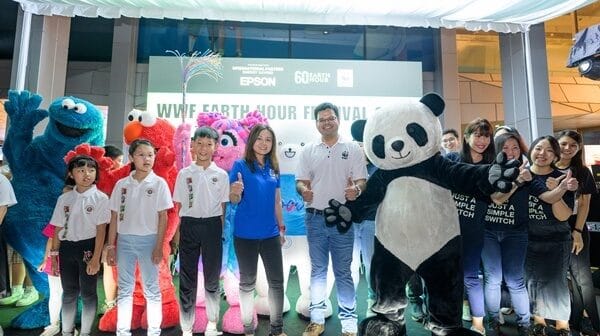The Earth Hour Festival, WWF-SG’s flagship global environmental movement was held recently on March 23rd (Saturday) from 11:00am – 9:30pm. The festival served as a monumental showcase of environmental advocacy and community engagement, captivating attendees with an array of edutainment activities and exciting performances, all leading to the symbolic Switch Off ceremony as Singapore goes dark.
Set against the vibrant backdrop of Orchard Road, Singapore’s bustling shopping district, the Switch Off event transformed the cityscape into a beacon of solidarity for global environmental conservation efforts. Throughout the day, families and communities immersed themselves in interactive experiences aimed at fostering eco-consciousness and understanding. Highlights of the 23 Festival activities included The WWF Nature, Climate, and Community edu-tainment booths, available throughout the day, featuring engaging educational games. Additionally, Mediacorp’s ‘Ask Wobi Anything’ session with okto’s Lil Wild character, Wobi, entertained children while addressing environment-related questions. Attendees also enjoyed a special meet-and-greet with beloved Sesame Street characters and engaging booth activities hosted by partners such as Epson (International Partner) and Watsons Singapore (Lead Partner). The festival reached its pinnacle with the unveiling of WWF-Singapore’s groundbreaking hour bank initiative. The Earth Hour Festival served not only as a celebration of environmental stewardship but also as a testament to the power of collective action in safeguarding our planet for future generations.
Our editorial team interviewed Jayasri Srikantan Lakshminarayanan, Head of Education Outreach at WWF-Singapore where she shared more and provided valuable insights into the Earth Hour movement and its focus on engaging children, youth in environmental initiatives and others. Read on to find out more.

Interview with Jayasri Srikantan Lakshminarayanan, Head of Education Outreach at WWF-Singapore
1. Tell me a bit more about this year’s Earth Hour Festival and how it is different from previous years’?
Jayasri Srikantan Lakshminarayanan: This year’s Earth Hour Festival placed significant emphasis on collective action through meaningful partnerships and individual pledges. This year, Epson came on board as the first-ever international corporate partner of Earth Hour, leading by example on the importance of strategic collaborations in rallying climate action. In addition to that, we launched the global Hour Bank initiative in Singapore, urging individuals to dedicate an hour or more of their time towards climate action through sustainable and climate-positive activities. The goal is to encourage individuals to spend at least an hour of their time doing something positive for the planet.
The festival on the 23rd of March included 23 activities scheduled throughout the day, catering to a diverse audience to ensure there was something enjoyable for everyone. WWF-Singapore featured three activity stations following our priority thematic areas at the event, each offering engagement and education through gamified experiences. The Climate & Sustainability booth aimed to raise awareness about the recyclable properties of different materials while the Nature booth taught players about ecosystem services in marine and terrestrial habitats and their role in promoting climate action. Additionally, the Community booth shared about our volunteer opportunities and promoted upcoming events, encouraging active participation in environmental initiatives.
Exclusive goodies that help encourage and promote environmentally friendly lifestyles were available for WWF members and donors to acknowledge their support. Partnering with Epson, WWF-Singapore emphasised the importance of environmental conservation through sustainable activities like using repurposed ink cartridges as plant pots. This partnership not only raised awareness about the climate crisis but also shared about WWF programmes supported by Epson on the restoration of the coral triangle, a biodiversity hotspot in Southeast Asia.
Engaging performances, such as those by the Green Drummers who utilised recycled materials to craft their instruments, added innovation and vibrancy to the event. Children were also able to partake in the festival through environmentally themed activities like face painting, glow-in-the-dark tattoos, and meet-and-greets with beloved characters Abby, Cookie Monster, and Elmo from Sesame Street. During the symbolic Switch Off moment, hosted by Joakim Gomez, special performances by WWF’s Eco-Schools, Damaru Singapore, and the Singapore Indian Fine Arts Society captivated attendees as lights dimmed across Orchard Road, marking a poignant moment in WWF-Singapore’s collective commitment to environmental conservation.
2. How do events like Earth Hour contribute to educating children about environmental issues, and what actions can they inspire in young people?
Jayasri Srikantan Lakshminarayanan: The Earth Hour Festival provided a unique platform to engage children in environmental education and awareness-building activities. Through interactive workshops, storytelling sessions, and hands-on experiences, children were able to learn about the importance of protecting the planet while participating in fun and meaningful activities that promote environmental stewardship. By empowering our future generations to become environmental champions, we can build a generation of informed and engaged citizens committed to safeguarding the planet.
In addition to their numerous episodes focusing on environmental topics, Sesame Street’s participation in Earth Hour highlights the importance of addressing environmental issues in our children’s education system and their daily lives. This collaboration represents the common goal of environmental action aimed at driving meaningful impact for the long term.
3. In Earth Hour, symbolic actions like switching off lights for an hour are significant. How can these gestures resonate with children, helping them understand the broader implications of energy consumption and climate change?
Jayasri Srikantan Lakshminarayanan: These gestures serve as powerful tools for engaging young minds and helping them grasp the broader implications of energy consumption and climate change. When children participate in environmental initiatives such as the Switch Off, we want them to feel a sense of ownership and responsibility towards the planet. Hands-on experience can also foster a deeper connection with nature to instill a sense of environmental stewardship from a young age. We hope that exposure to such activities will help children to realise that even small changes in everyday behaviour, like turning off lights that are not in use, can play a part in positively impacting the reduction of carbon emissions and mitigation of climate change.
Additionally, Earth Hour encourages the young to think more creatively about alternative ways to conserve energy and protect the planet. The Earth Hour Festival showcased projects by the students of Henry Park Primary School, providing a relatable and engaging experience for other children attending the event. These students also serve as an inspiration to youth attendees as we witnessed many of them using the opportunity to ask questions, share ideas, and learn from adults and peers about the interconnectedness of energy consumption, climate change, and biodiversity loss during the event. These discussions play a significant part in developing their critical thinking skills and deepening their understanding of complex environmental concepts in a relatable and accessible manner.
4. What role do you believe schools and educational institutions play in promoting initiatives like Earth Hour and integrating environmental education into their curriculum?
Jayasri Srikantan Lakshminarayanan: Schools and educational institutions play a significant role in instilling environmental stewardship values in children. The integration of environmental education into the curriculum ensures that students receive comprehensive knowledge about key environmental concepts and challenges. By weaving sustainability themes and discussions into subjects such as science, geography, and social studies, schools equip students with the skills and understanding needed to address complex environmental issues in the future.
Moreover, schools serve as laboratories for hands-on learning and practical application of environmental principles. Through initiatives like WWF’s Eco-Schools Programme, students have the opportunity to engage in real-world projects that promote sustainability within their school community and beyond. These student-led learning opportunities empower students to become future sustainability leaders in their own right.
Additionally, partnerships between schools, government agencies, and non-profit organisations play a vital role in amplifying the impact of environmental education initiatives. By collaborating with organisations like WWF Singapore, schools gain access to resources, expertise, and support networks that enhance their capacity to deliver high-quality environmental education programmes.
In Singapore, initiatives such as the Eco-Stewardship Programme by the Ministry of Education exemplify the collaborative efforts between schools and community stakeholders to promote environmental sustainability. These initiatives provide students with opportunities to actively participate in environmental conservation efforts and contribute to building a more sustainable future for Singapore.
5. How can parents and caregivers encourage their children to participate in Earth Hour and other environmental initiatives, fostering a sense of responsibility towards the planet from a young age?
Jayasri Srikantan Lakshminarayanan: Every parent and caregiver can nurture a sense of responsibility towards the planet by setting an example and incorporating sustainable habits into their daily lives. This could include conserving electrical energy and reducing waste at home, or taking your children out to Singapore’s nature reserves and parks where they can learn more about the natural world to develop a deeper appreciation for it. Ultimately, parents could make learning and education on sustainability fun for children! I would like to invite parents to visit the Hour Bank at https://www.wwf.sg/earthhour/hour-bank/ with your children, and together, make your pledge to our planet.
6. What were the various activities that children participated in during the Earth Hour festival, and can you share some key highlights of this year?
Jayasri Srikantan Lakshminarayanan: Children who participated in our Earth Hour Festival had access to a series of engaging activities.
Key festival highlights include:
- The WWF Nature, Climate & Sustainability, and Community edu-tainment booths, available throughout the day.
- Attendees could delve into the complexities of climate change by engaging in educational games that illuminate impacts and solutions
- To engage children, Mediacorp organised an “Ask Wobi Anything” with Okto’s Lil Wild character, Wobi, who answered all their environmental-related questions
- Meet and Greet with Sesame Street’s Abby, Cookie Monster, and Elmo to represent the collaboration and common goal of addressing environmental issues
- Students from Henry Park Primary School shared how they promote environmental sustainability around their campus while giving away their multipurpose cleaning concoction made from eco-enzymes.
7. Looking ahead, how can the momentum generated by events like Earth Hour be sustained to ensure meaningful change, particularly among younger generations who will inherit the environmental challenges we face today?
Jayasri Srikantan Lakshminarayanan: Going Beyond the Hour, there are many ways one can get involved in a meaningful manner to tackle complex environmental issues. At WWF-Singapore, one of our thematic pillars focuses on community engagement, offering various opportunities for individuals to be involved.
One of which is our recently concluded #WeGotThis Year 3 programme, in partnership with Temasek Foundation, marked an exciting milestone in youth sustainability initiatives. This round, the sustainability incubator programme expanded its reach worldwide and offered participants from around the globe to join in on our virtual festival. An in-person campaign clinic was also made available for youths across the region. At the end, selected participants embarked on a 10-week incubator programme designed to nurture future sustainability leaders and create pathways for impactful change.
In another effort to promote environmental education and appreciation for Singapore’s natural heritage, WWF-Singapore offers educational guided tours at Rifle Range Nature Park for members of the public, providing a unique opportunity to explore and learn about our local biodiversity. These free monthly guided walks have been well-received since their inception in January 2023, with over 120 participants having already benefited from the immersive experience.
Furthermore, WWF-Singapore’s Eco-Schools programme has left a significant impact over the past decade, engaging nearly 9,000 students from over 140 schools and empowering 27 teachers through its educators’ programme. Notably, Mr. Jacob Tan, a distinguished teacher at Commonwealth Secondary School participating in the Eco-Schools programme, was recently honoured with the prestigious President’s Award for the Environment, showcasing his exemplary leadership in environmental education. Commonwealth Secondary School also achieved the internationally recognised Eco-Schools Green Flag, highlighting its steadfast commitment to environmental sustainability and education.
Consistently engaging in climate-conscious activities is crucial for fostering and sustaining positive change over time. The actions, whether large or small, play a crucial role in driving lasting impact.
Find out more about The Earth Hour Festival at https://www.wwf.sg/earthhour/





1 Comment
This is such an insightful interview, thanks for sharing!